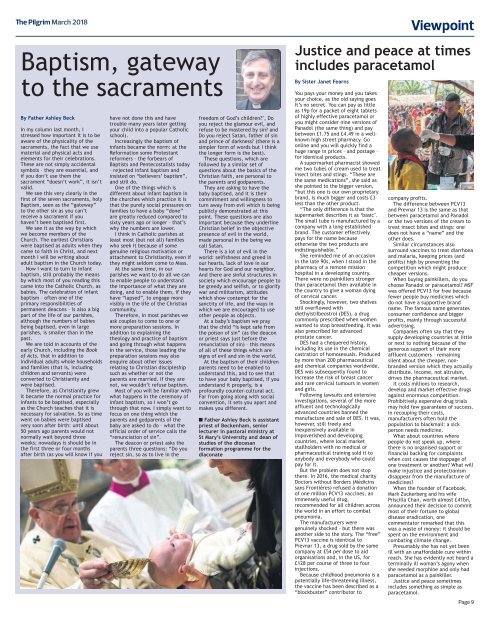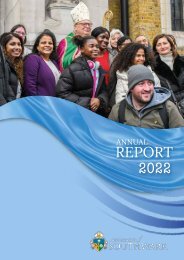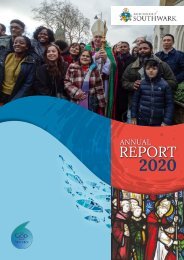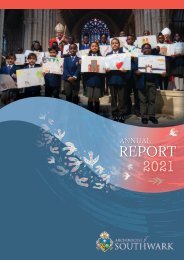Issue 69 - The Pilgrim - March 2018 - The newspaper of the Archdiocese of Southwark
The March 2018 issue of "The Pilgrim", the newspaper of the Archdiocese of Southwark
The March 2018 issue of "The Pilgrim", the newspaper of the Archdiocese of Southwark
Create successful ePaper yourself
Turn your PDF publications into a flip-book with our unique Google optimized e-Paper software.
<strong>The</strong> <strong>Pilgrim</strong> <strong>March</strong> <strong>2018</strong><br />
Baptism, gateway<br />
to <strong>the</strong> sacraments<br />
By Fa<strong>the</strong>r Ashley Beck<br />
In my column last month, I<br />
stressed how important it is to be<br />
aware <strong>of</strong> <strong>the</strong> physicality <strong>of</strong> <strong>the</strong><br />
sacraments, <strong>the</strong> fact that we use<br />
material and physical acts and<br />
elements for <strong>the</strong>ir celebrations.<br />
<strong>The</strong>se are not simply accidental<br />
symbols – <strong>the</strong>y are essential, and<br />
if you don’t use <strong>the</strong>m <strong>the</strong><br />
sacrament “doesn’t work”, it isn’t<br />
valid.<br />
We see this very clearly in <strong>the</strong><br />
first <strong>of</strong> <strong>the</strong> seven sacraments, holy<br />
Baptism, seen as <strong>the</strong> “gateway”<br />
to <strong>the</strong> o<strong>the</strong>r six as you can’t<br />
receive a sacrament if you<br />
haven’t been baptised first.<br />
We see it as <strong>the</strong> way by which<br />
we become members <strong>of</strong> <strong>the</strong><br />
Church. <strong>The</strong> earliest Christians<br />
were baptised as adults when <strong>the</strong>y<br />
came to faith in Christ, and next<br />
month I will be writing about<br />
adult baptism in <strong>the</strong> Church today.<br />
Now I want to turn to infant<br />
baptism, still probably <strong>the</strong> means<br />
by which most <strong>of</strong> you reading this<br />
came into <strong>the</strong> Catholic Church, as<br />
babies. <strong>The</strong> celebration <strong>of</strong> infant<br />
baptism – <strong>of</strong>ten one <strong>of</strong> <strong>the</strong><br />
primary responsibilities <strong>of</strong><br />
permanent deacons – is also a big<br />
part <strong>of</strong> <strong>the</strong> life <strong>of</strong> our parishes,<br />
although <strong>the</strong> numbers <strong>of</strong> babies<br />
being baptised, even in large<br />
parishes, is smaller than in <strong>the</strong><br />
past.<br />
We are told in accounts <strong>of</strong> <strong>the</strong><br />
early Church, including <strong>the</strong> Book<br />
<strong>of</strong> Acts, that in addition to<br />
individual adults whole households<br />
and families (that is, including<br />
children and servants) were<br />
converted to Christianity and<br />
were baptised.<br />
<strong>The</strong>refore, as Christianity grew<br />
it became <strong>the</strong> normal practice for<br />
infants to be baptised, especially<br />
as <strong>the</strong> Church teaches that it is<br />
necessary for salvation. So as time<br />
went on babies were baptised<br />
very soon after birth: until about<br />
50 years ago parents would not<br />
normally wait beyond three<br />
weeks; nowadays is should be in<br />
<strong>the</strong> first three or four months<br />
after birth (as you will know if you<br />
have not done this and have<br />
trouble many years later getting<br />
your child into a popular Catholic<br />
school).<br />
Increasingly <strong>the</strong> baptism <strong>of</strong><br />
infants became <strong>the</strong> norm: at <strong>the</strong><br />
Reformation some Protestant<br />
reformers – <strong>the</strong> forbears <strong>of</strong><br />
Baptists and Pentecostalists today<br />
– rejected infant baptism and<br />
insisted on “believers’ baptism”,<br />
and still do.<br />
One <strong>of</strong> <strong>the</strong> things which is<br />
different about infant baptism in<br />
<strong>the</strong> churches which practice it is<br />
that <strong>the</strong> purely social pressures on<br />
families to have a baby “done”<br />
are greatly reduced compared to<br />
sixty years ago or longer – that’s<br />
why <strong>the</strong> numbers are lower.<br />
I think in Catholic parishes at<br />
least most (but not all) families<br />
who seek it because <strong>of</strong> some<br />
genuine religious motivation or<br />
attachment to Christianity, even if<br />
<strong>the</strong>y might seldom come to Mass.<br />
At <strong>the</strong> same time, in our<br />
parishes we want to do all we can<br />
to enable people to understand<br />
<strong>the</strong> importance <strong>of</strong> what <strong>the</strong>y are<br />
doing, and to enable <strong>the</strong>m, if <strong>the</strong>y<br />
have “lapsed”, to engage more<br />
visibly in <strong>the</strong> life <strong>of</strong> <strong>the</strong> Christian<br />
community.<br />
<strong>The</strong>refore, in most parishes we<br />
ask couples to come to one or<br />
more preparation sessions. In<br />
addition to explaining <strong>the</strong><br />
<strong>the</strong>ology and practice <strong>of</strong> baptism<br />
and going through what happens<br />
in <strong>the</strong> service, those leading <strong>the</strong><br />
preparation sessions may also<br />
enquire about o<strong>the</strong>r issues<br />
relating to Christian discipleship<br />
such as whe<strong>the</strong>r or not <strong>the</strong><br />
parents are married. If <strong>the</strong>y are<br />
not, we wouldn’t refuse baptism.<br />
Most <strong>of</strong> you will be familiar with<br />
what happens in <strong>the</strong> ceremony <strong>of</strong><br />
infant baptism, so I won’t go<br />
through that now. I simply want to<br />
focus on one thing which <strong>the</strong><br />
parents and godparents <strong>of</strong> <strong>the</strong><br />
baby are asked to do – what <strong>the</strong><br />
<strong>of</strong>ficial order <strong>of</strong> service calls <strong>the</strong><br />
“renunciation <strong>of</strong> sin”.<br />
<strong>The</strong> deacon or priest asks <strong>the</strong><br />
parents three questions: “Do you<br />
reject sin, so as to live in <strong>the</strong><br />
freedom <strong>of</strong> God’s children?’, Do<br />
you reject <strong>the</strong> glamour evil, and<br />
refuse to be mastered by sin? and<br />
Do you reject Satan, fa<strong>the</strong>r <strong>of</strong> sin<br />
and prince <strong>of</strong> darkness? (<strong>the</strong>re is a<br />
simpler form <strong>of</strong> words but I think<br />
<strong>the</strong> longer form is <strong>the</strong> best).<br />
<strong>The</strong>se questions, which are<br />
followed by a similar set <strong>of</strong><br />
questions about <strong>the</strong> basics <strong>of</strong> <strong>the</strong><br />
Christian faith, are personal to<br />
<strong>the</strong> parents and godparents.<br />
<strong>The</strong>y are asking to have <strong>the</strong><br />
baby baptised, and it is <strong>the</strong>ir<br />
commitment and willingness to<br />
turn away from evil which is being<br />
publicly demonstrated at this<br />
point. <strong>The</strong>se questions are also<br />
important because <strong>the</strong>y underline<br />
Christian belief in <strong>the</strong> objective<br />
presence <strong>of</strong> evil in <strong>the</strong> world,<br />
made personal in <strong>the</strong> being we<br />
call Satan.<br />
<strong>The</strong>re is a lot <strong>of</strong> evil in <strong>the</strong><br />
world: selfishness and greed in<br />
our hearts, lack <strong>of</strong> love in our<br />
hearts for God and our neighbor.<br />
And <strong>the</strong>re are sinful structures in<br />
society which encourage people to<br />
be greedy and selfish, or to glorify<br />
war and militarism, attitudes<br />
which show contempt for <strong>the</strong><br />
sanctity <strong>of</strong> life, and <strong>the</strong> ways in<br />
which we are encouraged to use<br />
o<strong>the</strong>r people as objects.<br />
At a baby’s baptism we pray<br />
that <strong>the</strong> child “is kept safe from<br />
<strong>the</strong> poison <strong>of</strong> sin” (as <strong>the</strong> deacon<br />
or priest says just before <strong>the</strong><br />
renunciation <strong>of</strong> sin) – this means<br />
<strong>of</strong> all <strong>of</strong> <strong>the</strong>se things which are<br />
signs <strong>of</strong> evil and sin in <strong>the</strong> world.<br />
At <strong>the</strong> baptism <strong>of</strong> <strong>the</strong>ir children<br />
parents need to be enabled to<br />
understand this, and to see that<br />
to have your baby baptised, if you<br />
understand it properly, is a<br />
pr<strong>of</strong>oundly counter-cultural act.<br />
Far from going along with social<br />
convention, it sets you apart and<br />
makes you different.<br />
n Fa<strong>the</strong>r Ashley Beck is assistant<br />
priest <strong>of</strong> Beckenham, senior<br />
lecturer in pastoral ministry at<br />
St Mary’s University and dean <strong>of</strong><br />
studies <strong>of</strong> <strong>the</strong> diocesan<br />
formation programme for <strong>the</strong><br />
diaconate<br />
Viewpoint<br />
Justice and peace at times<br />
includes paracetamol<br />
By Sister Janet Fearns<br />
You pays your money and you takes<br />
your choice, as <strong>the</strong> old saying goes<br />
It’s no secret. You can pay as little<br />
as 19p for a packet <strong>of</strong> eight tablets<br />
<strong>of</strong> highly effective paracetamol or<br />
you might consider nine versions <strong>of</strong><br />
Panadol (<strong>the</strong> same thing) and pay<br />
between £1.75 and £4.49 in a wellknown<br />
high street pharmacy. Go<br />
online and you will quickly find a<br />
huge range in prices – and postage –<br />
for identical products.<br />
A supermarket pharmacist showed<br />
me two tubes <strong>of</strong> cream used to treat<br />
insect bites and stings. “<strong>The</strong>se are<br />
<strong>the</strong> same medications”, she said as<br />
she pointed to <strong>the</strong> bigger version,<br />
“but this one is our own proprietary<br />
brand, is much bigger and costs £3<br />
less than <strong>the</strong> o<strong>the</strong>r product.<br />
“<strong>The</strong> only difference is that <strong>the</strong><br />
supermarket describes it as ‘basic’.<br />
<strong>The</strong> small tube is manufactured by a<br />
company with a long-established<br />
brand. <strong>The</strong> customer effectively<br />
pays for <strong>the</strong> name because<br />
o<strong>the</strong>rwise <strong>the</strong> two products are<br />
indistinguishable.”<br />
She reminded me <strong>of</strong> an occasion<br />
in <strong>the</strong> late 90s, when I stood in <strong>the</strong><br />
pharmacy <strong>of</strong> a remote mission<br />
hospital in a developing country.<br />
<strong>The</strong>re were no painkillers stronger<br />
than paracetamol <strong>the</strong>n available in<br />
<strong>the</strong> country to give a woman dying<br />
<strong>of</strong> cervical cancer.<br />
Shockingly, however, two shelves<br />
still overflowed with<br />
diethylstilbeostrol (DES), a drug<br />
commonly prescribed when women<br />
wanted to stop breastfeeding. It was<br />
also prescribed for advanced<br />
prostate cancer.<br />
DES had a chequered history,<br />
including its use in <strong>the</strong> chemical<br />
castration <strong>of</strong> homosexuals. Produced<br />
by more than 200 pharmaceutical<br />
and chemical companies worldwide,<br />
DES was subsequently found to<br />
increase <strong>the</strong> risk <strong>of</strong> breast cancer<br />
and rare cervical tumours in women<br />
and girls.<br />
Following lawsuits and extensive<br />
investigations, several <strong>of</strong> <strong>the</strong> more<br />
affluent and technologically<br />
advanced countries banned <strong>the</strong><br />
manufacture and sale <strong>of</strong> DES. It was,<br />
however, still freely and<br />
inexpensively available in<br />
impoverished and developing<br />
countries, where local market<br />
stallholders with no medical or<br />
pharmaceutical training sold it to<br />
anybody and everybody who could<br />
pay for it.<br />
But <strong>the</strong> problem does not stop<br />
<strong>the</strong>re. In 2016, <strong>the</strong> medical charity<br />
Doctors without Borders (Médicins<br />
sans Frontières) refused a donation<br />
<strong>of</strong> one million PCV13 vaccines, an<br />
immensely useful drug,<br />
recommended for all children across<br />
<strong>the</strong> world in an effort to combat<br />
pneumonia.<br />
<strong>The</strong> manufacturers were<br />
genuinely shocked – but <strong>the</strong>re was<br />
ano<strong>the</strong>r side to <strong>the</strong> story. <strong>The</strong> “free”<br />
PCV13 vaccine is identical to<br />
Prevnar 13, a drug sold by <strong>the</strong> same<br />
company at £54 per dose to aid<br />
organisations and, in <strong>the</strong> US, for<br />
£128 per course <strong>of</strong> three to four<br />
injections.<br />
Because childhood pneumonia is a<br />
potentially life-threatening illness,<br />
<strong>the</strong> vaccine has been described as a<br />
“blockbuster” contributor to<br />
company pr<strong>of</strong>its.<br />
<strong>The</strong> difference between PCV13<br />
and Prevnar 13 is <strong>the</strong> same as that<br />
between paracetamol and Panadol<br />
or <strong>the</strong> two versions <strong>of</strong> <strong>the</strong> cream to<br />
treat insect bites and stings: one<br />
does not have a “name” and <strong>the</strong><br />
o<strong>the</strong>r does.<br />
Similar circumstances also<br />
surround vaccines to treat diarrhoea<br />
and malaria, keeping prices (and<br />
pr<strong>of</strong>its) high by preventing <strong>the</strong><br />
competition which might produce<br />
cheaper versions.<br />
When buying painkillers, do you<br />
choose Panadol or paracetamol? MSF<br />
was <strong>of</strong>fered PCV13 for free because<br />
fewer people buy medicines which<br />
do not have a supportive brand<br />
name. <strong>The</strong> famous name generates<br />
consumer confidence and bigger<br />
pr<strong>of</strong>its, mainly through successful<br />
advertising.<br />
Companies <strong>of</strong>ten say that <strong>the</strong>y<br />
supply developing countries at little<br />
or next to nothing because <strong>of</strong> <strong>the</strong><br />
generous support <strong>of</strong> <strong>the</strong>ir more<br />
affluent customers – remaining<br />
silent about <strong>the</strong> cheaper, nonbranded<br />
version which <strong>the</strong>y actually<br />
distribute. Income, not altruism,<br />
drives <strong>the</strong> pharmaceutical market.<br />
It costs millions to research,<br />
develop and market effective drugs<br />
against enormous competition.<br />
Prohibitively expensive drug trials<br />
may hold few guarantees <strong>of</strong> success.<br />
In recouping <strong>the</strong>ir costs,<br />
manufacturers <strong>of</strong>ten hold <strong>the</strong><br />
population to blackmail: a sick<br />
person needs medicine.<br />
What about countries where<br />
people do not speak up, where<br />
<strong>the</strong>re is no organised support or<br />
financial backing for complaints<br />
when cost causes <strong>the</strong> stoppage <strong>of</strong><br />
one treatment or ano<strong>the</strong>r? What will<br />
make injustice and protectionism<br />
disappear from <strong>the</strong> manufacture <strong>of</strong><br />
medicines?<br />
When <strong>the</strong> founder <strong>of</strong> Facebook,<br />
Mark Zuckerberg and his wife<br />
Priscilla Chan, worth almost £41bn,<br />
announced <strong>the</strong>ir decision to commit<br />
most <strong>of</strong> <strong>the</strong>ir fortune to global<br />
disease eradication, one<br />
commentator remarked that this<br />
was a waste <strong>of</strong> money: it should be<br />
spent on <strong>the</strong> environment and<br />
combating climate change.<br />
Presumably she has not yet been<br />
ill with an unaffordable cure within<br />
reach. She has evidently not heard a<br />
terminally ill woman’s agony when<br />
she needed morphine and only had<br />
paracetamol as a painkiller.<br />
Justice and peace sometimes<br />
includes something as simple as<br />
paracetamol.<br />
Page 9


















